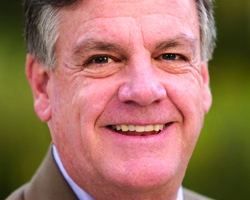A lifetime of public sector experience, several years working with a big-city municipal government and membership in a number of progressive organizations might seem like advantages for a contender for public office in a Westside city.
In Culver City, where like most small town all politics is local, only time will tell.
James Clarke is banking on his experience in government to open the door to his selection as one of the members to the Culver City City Council this spring. In the first installment of the News’ candidate profiles for the April 10 municipal election, Clarke laid out in detail the reasons why he hopes voters will help send him to the local city hall.
Asked why his was running for office during a time of economic uncertainty, he referenced a Chinese proverb, “Out of crisis comes opportunity,” and Clarke feels that his government experience and contacts will pay dividends with voters on election day.
He referred to these perceived assets frequently during the interview.
“We do face a significant financial challenge in Culver City,” the first-time candidate acknowledges. “That’s one of the reasons that I’m interested in running is because I think that my background and contacts will be very helpful in helping the city.”
Clarke, who is a deputy to Los Angeles Mayor Antonio Villaraigosa, says he also sees an opportunity to redefine “the Heart of Screenland” in the second decade of the 21st century. “It’s an opportunity to revisit our vision about where Culver City needs to go as a city and act on it,” he added.
Regarding finances, Clarke said that layoffs should be a part of any budget discussion, but feels there were significant cuts made last year. “I don’t think there’s a lot of room to cut,” he said.
Asked what difficult choices that he is willing to make if elected that he thinks would benefit the city’s bottom line, Clarke touched on a topic that has become a major discussion point in political circles in Culver City: the lifetime healthcare benefits that members of the council enjoy.
“The first thing that I’m willing to do is to get the city council out of the executive management classification and remove the lifetime medical benefits that are available to them,” the candidate said. “(The council) has done away with them for family members but they’re still available for existing members of council.”
Clarke, who has lived in Culver City since 1977, said that while the benefits did not constitute a large sum, “it’s a very symbolic amount, when there are people out there facing layoffs or without health insurance and the council needs to set an example.”
Culver City political consultant Jewett Walker said in a previous interview that it is always difficult for a first-time candidate to win a local election, but he feels that due to Clarke’s background, there could be an opening.
“(Clarke) has been involved in (political) campaigns before and he’s run them,” Walker said. “Whether that will translate into (electoral) success is questionable.”
For a first-time candidate, Walker said Clarke does bring one advantage that other novice contenders typically do not.
“He’s campaign savvy,” Walker said.
In order to succeed, Walker believes that Clarke needs to run a “first-rate” campaign, which includes introducing himself early to prospective voters.
Clarke touts his current position as director in the office of grants in Los Angeles and his history of securing federal grants as an asset for increasing Culver City’s fiscal strength, much like another novice candidate, current Culver City Unified School District board member Laura Chardiet did five months.
Chardiet is a grant coordinator for the Los Angeles Unified School District.
“In my current position, I go after all sorts of grants- federal, state, foundation, nonprofits- and I think that’s appealing to everybody,” Clarke said. “We all realize that we have to bring in more revenue to the city.”
For 10 years, Clarke was the executive recruiter for Korn/Ferry International, which he said is the world’s largest search firm. He specialized in public agencies and worked with city council and local agency boards, which he believes gives him a valuable measure of experiences in a race that has two incumbents and a former councilman who recently stepped down.
“I have a good understanding of how governing bodies operate and function together,” said the council challenger, who during his tenure at Korn/Ferry conducted recruitment for Culver City.
Clarke said one reason why his former employer become a top-notch recruitment firm was because at one time during a time of recession, Korn/Ferry made the decision to aggressively market its services while other firms where reducing overhead and expenditures.
“As a result it quickly became the number one firm while everyone one else was cutting back,” he recalled.
That formula, Clarke said, could serve as a template for a municipal government during a time of recession.
Clarke has landed a number of endorsements, including the support of Rep. Karen Bass (D- Culver City), as well as from members of different political factions in Culver City.
Days after the interview with the News, Clarke received more good news from one of Culver City’s top elected representatives.
“I am proud to endorse Jim Clarke for Culver City Council,” wrote Second District Supervisor Mark Ridley-Thomas in an email. “His leadership is exactly what Culver City and our region need right now. Jim’s vision will benefit the residents of Culver City.”
The supervisor’s endorsement adds to a growing list of supporters for the first-time candidate, including two groups whose philosophies could not be more different.
“I am the only candidate who has received both the endorsements of the chamber of commerce and the Culver City Democratic Club,” Clarke said proudly. “What I offer to the council is somebody who has had a lot of local government experience.”
Despite the endorsements, Clarke is still a newcomer on the local political scene. And Walker thinks that does not play to his favor.
“The better known candidates will be shoo-ins,” he predicted.
Engaging in anti-Los Angeles rhetoric or speaking ill of other cities, as some councilman have done in the past, is not something Clarke says he will do, nor does he see any benefit to the local time-honored practice. “It doesn’t do us any good to disparage other cities, but rather convince them that there’s a way that we can work together so that we can both come out of a situation with a win-win rather than with a lose-lose,” he said.
“What we have to do as far as shaping policy that impacts Culver City is to see if we can create a resolution for (neighboring) cities.”
The loss of the redevelopment agencies in February have created a potential domino effect that will likely alter how many of the city’s cultural programs will be structured in the future. Clarke proposes creating what he calls “Culver City Proud,” a venture that would encourage some of the city’s most affluent residents to become patrons of the arts and donate in local theatre and other cultural initiatives.
Asked if the reality is that residents should become accustomed to not having the same level of services due to the financial pinch, Clarke answered, “We’ve got to do what we’ve got to do.”
Clarke said there are they questions that he always asked candidates when interviewing their for jobs: can you do the job, will you do the job and if hired how will you make the organization or city’s life better?
Asked to answer the same questions he asked, he responded to the first question, “I think that my contacts and experience will allow me to do the job. I understand how councils work,” he reiterated.
“Will I do the job? Yes,” he said. For the first time I’m in a situation where I have the time and I’m able to do this, and I’m really excited about it.”
Clarke concluded by saying he would make life better for Culver City residents by working cooperatively other cities and leveraging his experience and contacts outside the city.
On April 10, the voters will get their chance to answer those same questions.













